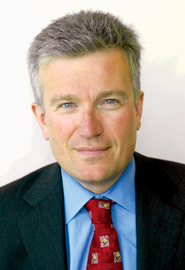New York Senator Charles Schumer and Duncan Niederauer, CEO of NYSE Euronext, both called today for more stringent regulations and greater accountability for dark pools. They spoke together on a joint midday conference call. Their comments come one day before the Securities and Exchange Commission’s planned meeting to propose new rules around dark pools.

"Now that the non-exchanges have established a viable foothold in our markets, it’s time we give this a second look," Schumer, a Democrat, told reporters and others on the call. He said dark pools should operate under a "set of rules much more similar to what traditional exchanges abide by." Schumer added that the playing field between exchanges and alternative trading systems, which include dark pools, is uneven.
Niederauer also stressed that competition between exchanges and ATSs "must occur on a more level playing field." He noted that there’s currently no SEC approval process for ATS rule filings. He recommended greater "convergence" between regulatory requirements for exchanges and dark pools to ensure that they operate according to similar standards.
In the view of both men, this uneven regulatory turf has hurt exchanges by enabling more trading to take place off-board. Dark pools, or alternative trading systems that do not display quotes publicly, represent close to 10 percent of the industry’s equities volume, almost half the total portion of off-board volume. However, the total share of off-board volume executed in non-public markets has risen only several percentage points over the last two decades. As dark pools have grown, executions that took place on upstairs desks at broker-dealers have shifted over to dark pools.
Both men also argued that market surveillance across trading venues should be centralized in a single authority, with the costs "distributed in line with market share," as Niederauer put it. Referring to trading venues generally, he said "none of us has enough data to do it" alone.
The SEC meets tomorrow to vote on several proposed rules involving dark pools. These include lowering the threshold for display requirements under Regulation ATS, to probably 1 or 2 percent from the current 5 percent level, according to market participants. In addition, the SEC will address actionable indications of interest and post-trade reporting for dark pools.
Sen. Schumer said he has written a letter to SEC Chairman Mary Schapiro recommending the proposed changes the SEC is already due to consider tomorrow, along with several others. These additional recommendations include the consolidation of market surveillance in a single regulatory authority, with the costs distributed proportionally to market centers, based on trading volume. In addition, he said, the SEC "should have the right to pre-approve any material changes to [ATSs’] operations," which would help level the playing field between ATSs and exchanges. The SEC, he said, should also require that ATSs have robust systems in place to ensure their safe and sound operations.
Some of the suggestions made today echo the refrain of exchange executives at the Security Traders Association annual conference last week, in Scottsdale, Arizona. Joe Mecane, executive vice president for U.S. markets at NYSE Euronext, said at the conference that what exchange can and can’t do as readily as ATSs raises competitive issues. Dark pools within an exchange, he said, "get regulated and overseen the way our exchange does." Dark pools operated by broker-dealers and structured as ATSs, he suggested, do not have to run through the same gauntlet of rule filings and oversight requirements.
Brian Hyndman, senior vice president for transaction services at Nasdaq OMX Group, said at the STA conference that his firm is concerned about the ability of dark pools to connect to one another through the use of automated IOIs. Nasdaq OMX, he said, is concerned about "connectivity and the network effect," he said, referring to the ability of dark pools to link to one another in an effort to seek out contra-side liquidity and avoid routing orders to exchanges.
David Franasiak, a principal at law firm Williams & Jensen in Washington, D.C., who represents the STA, noted at the Scottsdale conference that issues around dark pools as well as other regulatory topics cause friction between exchanges and broker-dealers because of overlapping interests. Both sets of market participants compete for order flow. "There is, frankly, a lot of business model bumping and elbowing here," referring to opinions about various regulatory initiatives on the SEC’s plate.



